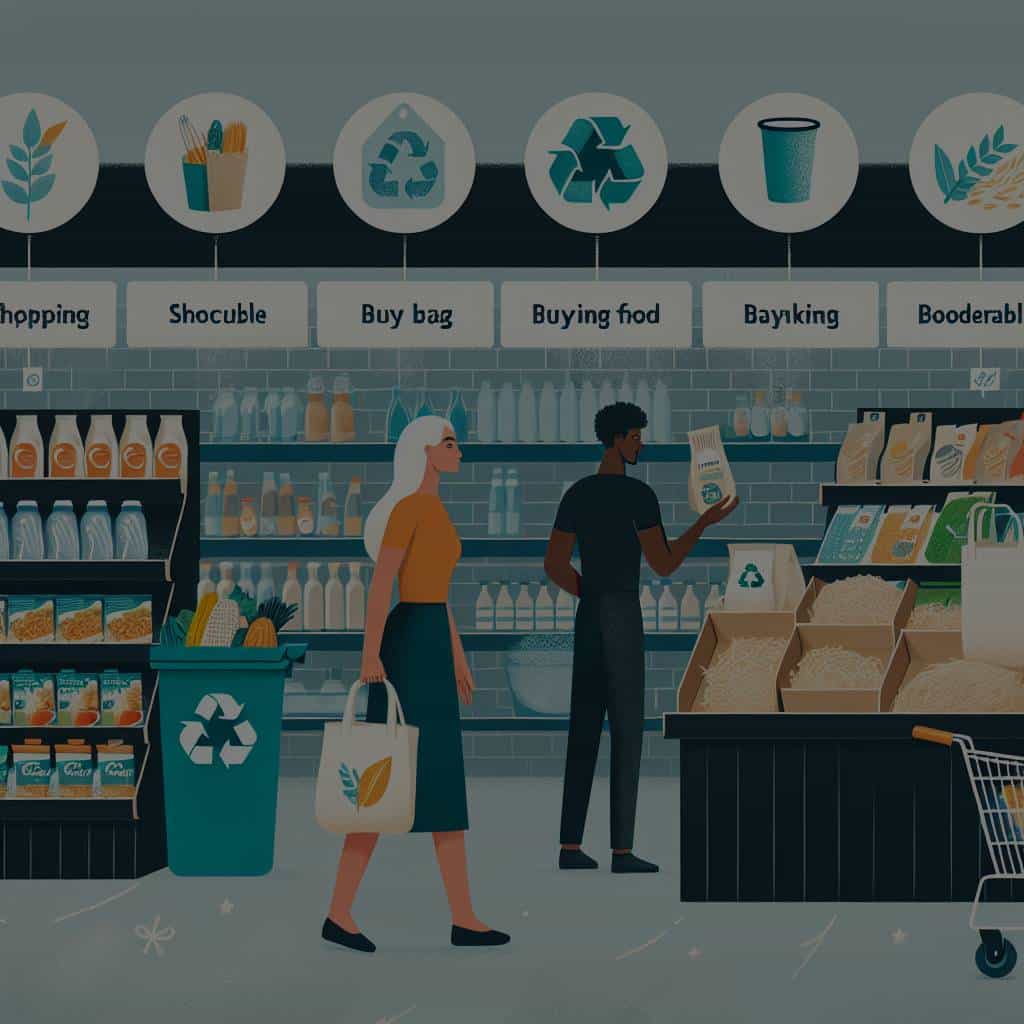What Are the Strategies for Reducing Single-Use Plastic in UK’s Food Industry?

In the contemporary era, the global issue of plastic waste has become a significant concern. It is particularly prevalent in the food industry, where single-use plastic packaging is ubiquitous. However, there’s a silver lining as businesses are adopting innovative strategies to reduce the reliance on such materials. The shift is significantly noticeable in the UK’s food industry where businesses are tackling plastic waste through a variety of approaches. This article will examine some of the key strategies employed by the UK’s food industry to move away from single-use plastics.
Reduction and Replacement of Plastic Packaging
The first line of defense against plastic waste is to reduce the amount of plastic used in packaging. This strategy focuses on minimising the use of single-use plastics, which are often not recycled and end up in landfill or the environment.
Avez-vous vu cela : Unleash excitement with the ultimate goated mystery box
The reduction of plastic in packaging can be achieved through several methods. For example, businesses can optimise their packaging designs to use less material, or they can switch to smaller or lighter packaging options.
Another effective strategy is to replace plastic packaging with alternative materials. Many businesses in the UK’s food industry are exploring the use of bio-based, compostable, and recyclable materials as substitutes for traditional plastic packaging. For instance, some companies are using cardboard, glass, and metal containers, which are easier to recycle than plastic. Others are experimenting with innovative materials, such as edible or compostable packaging made from plant-based ingredients.
A lire en complément : What’s the Impact of Remote Work on UK’s Commercial Real Estate Market?
While substitution is a viable strategy, it requires careful consideration. Businesses must assess the environmental impact of alternative materials, as not all alternatives are necessarily better than plastic in terms of their production, use, and end-of-life disposal.
Reuse of Packaging Materials
Moving on from reduction and replacement, reusing packaging materials is another key strategy in limiting the use of single-use plastics in the food industry. The concept of reuse is not new, but there is a renewed interest in it due to growing environmental concerns.
Businesses are rethinking their packaging systems to facilitate the return and reuse of containers. Some are implementing deposit-return schemes, where customers pay a small deposit on the packaging and get it back when they return the container. Others are offering discounts to customers who bring their own containers or bags.
Another trend in the food industry is the growth of zero-waste shops, which encourage customers to bring their own containers for purchasing bulk goods. These shops aim to eliminate packaging waste altogether by selling products without any packaging.
The reuse of packaging materials not only reduces plastic waste but also saves resources and energy that would otherwise be used in the production of new packaging. However, it requires consumer participation and changes in shopping habits, which can be challenging to achieve.
Recycling of Plastic Waste
Recycling is a common strategy for managing plastic waste, but it has its limitations. Not all types of plastic are recyclable, and even those that are often do not get recycled due to a lack of recycling facilities or systems.
Nevertheless, businesses in the food industry are making efforts to improve the recyclability of their plastic packaging. This involves using plastics that are easily recyclable and designing packaging to be easily separated into recyclable components.
Some businesses are also working with waste management companies to ensure that their packaging gets recycled. They are investing in infrastructure and technologies to increase the collection and recycling of plastic waste, and they are educating consumers about proper recycling practices.
Recycling can help to reduce the amount of new plastic that needs to be produced, but it is not a panacea for the plastic waste problem. It needs to be combined with other strategies such as reduction, replacement, and reuse to make a significant impact.
Promoting Consumer Awareness and Engagement
Ultimately, the success of any strategy to reduce single-use plastic depends on consumer support. Therefore, promoting consumer awareness and engagement is crucial for businesses in the food industry.
Companies are educating consumers about the environmental impact of plastic waste and the importance of sustainable practices. They are using transparent labelling to indicate the recyclability of their packaging and to guide consumers in making environmentally-friendly choices.
Some businesses are also engaging consumers through campaigns and initiatives that encourage sustainable behaviour. For example, they may offer incentives for returning packaging for reuse or recycling, or they may organise events or challenges to promote waste reduction and recycling.
While consumer engagement is essential, businesses also have a responsibility to make sustainable choices easy and accessible for consumers. This can involve offering a range of sustainable products, providing convenient recycling facilities, and ensuring that sustainable options are affordable and attractive.
Collaborating with Stakeholders
The plastic waste issue is complex and cannot be solved by businesses alone. Collaboration with various stakeholders – including government bodies, non-profit organisations, research institutions, and other businesses – is an important strategy for achieving meaningful and lasting change.
Businesses can work with these stakeholders to develop and implement effective policies, regulations, and initiatives to reduce plastic waste. They can also collaborate on research and development to innovate new materials and technologies that could replace single-use plastics.
As part of their collaboration efforts, businesses can advocate for systemic changes that support the shift towards a circular economy, where resources are reused and recycled rather than discarded. This includes lobbying for policies that incentivise reuse and recycling, supporting efforts to improve waste management infrastructure, and promoting sustainable consumption and production patterns.
The UK’s food industry is leading by example in its efforts to reduce single-use plastic. Through a combination of reduction, replacement, reuse, recycling, consumer engagement, and collaboration strategies, it is demonstrating that a more sustainable future is within reach. This is not just good for the environment, but it is also good for businesses as it can enhance their reputation, improve customer loyalty, and lead to cost savings in the long term. However, continuous effort and innovation will be required to overcome the challenges and truly make the transition to a plastic-free future.
The Role of Intelligent Packaging and Bio-Based Alternatives
In the fight against single-use plastics, businesses are exploring the potential of intelligent packaging. This innovative form of packaging integrates technology with packaging materials to provide added benefits such as improved food safety, extended shelf-life and reduced food waste. For example, intelligent packaging can include sensors that monitor the freshness of food, providing valuable information that can help in reducing food waste.
Additionally, intelligent packaging can play a vital role in facilitating recycling. For example, it can include markers that make it easier to sort and separate different materials in recycling facilities, thus helping to increase the recycling rates of plastic packaging.
On the other hand, bio-based alternatives to conventional plastics are gaining momentum. These materials, derived from renewable resources like corn, sugarcane or algae, are designed to be biodegradable or compostable, thus offering a more sustainable solution to plastic packaging. However, it’s important to note that while they are a promising alternative, they also require careful lifecycle analysis to ensure they are indeed a better environmental choice. Misconceptions about their compostability could potentially lead to more plastic pollution if they are not disposed of properly.
On the whole, both intelligent packaging and bio-based alternatives present exciting trajectories away from single-use plastics. However, for these solutions to be effective, businesses must ensure that they are used and disposed of correctly, and that they do not inadvertently contribute to other environmental problems.
Transition to a Plastic-Free Future: Challenges and Opportunities
Transitioning to a plastic-free future is no small task. It requires a holistic approach that not only replaces single-use plastics but also alters consumption patterns and waste management practices.
One of the key challenges in this journey is changing consumer behaviour. Many people are accustomed to the convenience of single-use plastics, and shifting their habits towards reusable packaging may require substantial education and incentives. Businesses have a crucial role to play in this aspect, by implementing policies that encourage consumers to opt for plastic-free and reusable packaging solutions.
Another challenge lies in the development and scaling up of alternatives to single-use plastics. While there are many promising innovations in this area, such as bio-based materials and intelligent packaging, they still face hurdles in terms of cost, performance, and consumer acceptance. Research and development, as well as collaboration among businesses, research institutions, and government bodies, are essential to overcome these barriers.
Despite these challenges, the transition to a plastic-free future presents numerous opportunities. It can lead to cost savings for businesses through efficiency gains and reduced waste disposal costs. It can also enhance their reputation and customer loyalty, as more and more consumers are demanding sustainable products and practices. Moreover, it can contribute to broader goals of resource efficiency and circular economy, thereby helping to create a more sustainable and resilient society.
In conclusion, reducing single-use plastic in the UK’s food industry is a complex task that requires a multi-pronged approach. From reducing and replacing plastic packaging, promoting reuse and recycling, to fostering consumer engagement and stakeholder collaboration, each strategy plays a critical role in shaping a plastic-free future. While the journey is fraught with challenges, the opportunities it presents are immense. With continuous effort, innovation, and collaboration, a sustainable, plastic-free future is indeed within reach.
